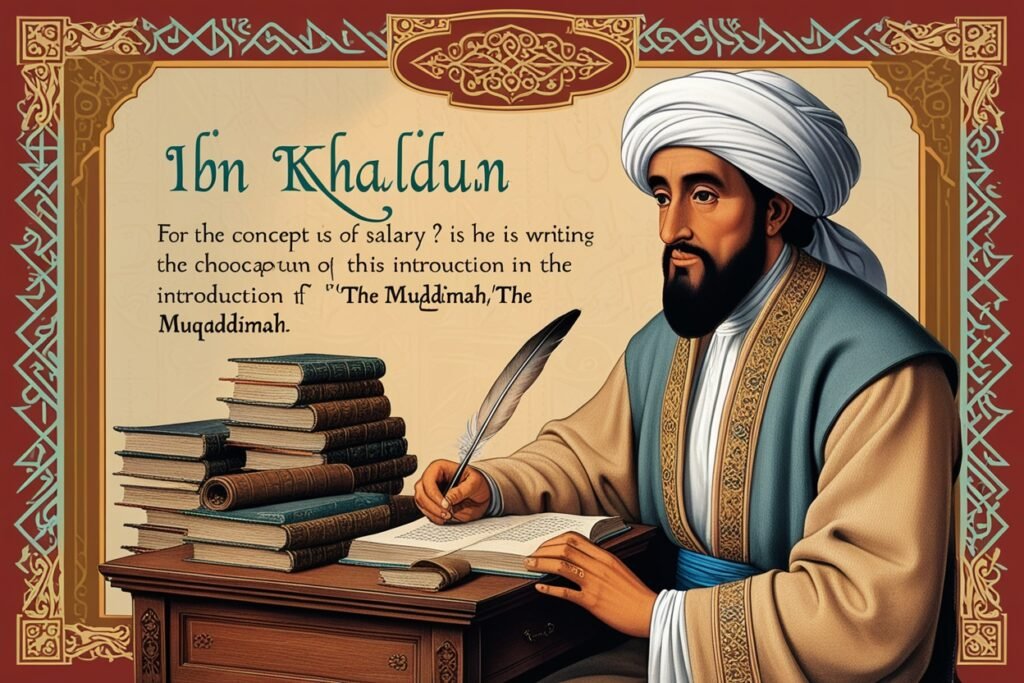Pension :
Economic sociology emerged as a new field around the end of the 19th century. Studying a nation’s economy and how it impacts society as a whole is the aim of this research. However, hundreds of years before to the establishment of this field, Ibn Khaldun attempted to investigate the economic and social circumstances of people, and he discussed a crucial concept: the concept of livelihood. According to Ibn Khaldun, livelihood refers to the idea that you are searching for food, or that you work. According to Ibn Khaldun, the capacity for labor is a key indicator of civilization. Everywhere there is more civilization, the more people working. Ibn Khaldun asserts that God has given man everything that enables him to achieve in this life and that all he needs to do is work hard. Man can work in any sector he enjoys, as long as it generates a living. This includes literature, fishing, industry, trade, agriculture, and any other field he finds fulfilling. For instance, Ibn Khaldun denounced the practice of stealing antiquities, which is still a prevalent technique of obtaining illegitimate wealth. According to Ibn Khaldun, the individual who takes valuables out of coffins and pharaonic tombs is a failure, someone who has the capacity to acquire money legally, and someone who is utterly powerless since he lacks any skill that would enable him to generate incomeHe solely uses cunning and dishonesty. For instance, in order to profit from behind the pharaohs, he depends on exploiting myths and fairy tales about them. In any nation, you will also discover individuals of prestige, authority, and power. This kind of person will discover that a sizable crowd is congregating around them to pursue a certain passion. You think of yourself as degrading yourself to get the attention you desire if you work for someone like them.
The concept of servants, or the idea that you have someone who serves you, is one of the things that Ibn Khaldun fiercely condemns. He believes that the concept in question is not one of the natural occupations that society ought to have. Simultaneously, Ibn Khaldun believes that a person who relies on servants in his life is someone who struggles with manhood, impotence, and dependence on others. He also wastes a lot of money on servants.
A person can work in industry, trade, or agriculture, if we look at the primary occupations that people can undertake. According to Ibn Khaldun, a peasant who works in agriculture is either one of the weaker members of society or he is a member of the Bedouins, who are individuals who have lived in rural villages their entire lives. Regarding the individual who works in the trade, Ibn Khaldun states that in order to truly assert his rights and continue to be a shrewd trader, he must possess the capacity for bargaining, negotiation, and courage. Ibn Khaldun argues that a person who works in the trades cannot be a coward or a nice person because of this. However, he feels that working in the trade is challenging for kings and nobles because it forces them to perform some things that may be repugnant to kings’ morals.
Ibn Khaldun holds that everyone who attempts to master a profession must be capable of performing the task at hand. This is especially true in the industrial domains. Working under someone who genuinely has a lot of experience will help him learn over time and get to the point of mastery if he wants to succeed and achieve the mastery stage of what he is doing. Ibn Khaldun distinguishes between two categories of industrial fields: necessity and luxury.
The necessary type is the kind that is related to the country’s important demands, which include the construction, knitting, carpentry, sewing, and some agricultural sectors. These are all fundamental and essential necessities in any nation. Regarding the luxury industries, these are those that don’t have a significant impact on the lives of the majority of people, such duplicating books, singing, or poetry. In the present day, for instance, there are luxury demands like TV shows and movies. Most individuals don’t care about any of these industries.
luxury requirements that individuals may live without in order to go about their daily lives. There are also sectors known as honorable industries in addition to luxury and essential industries. Examples of these are literature, which aids in knowledge transfer, and medicine, which maintains human health. The more development and advancement a nation experiences, the more industries—particularly luxury industries—it produces.

